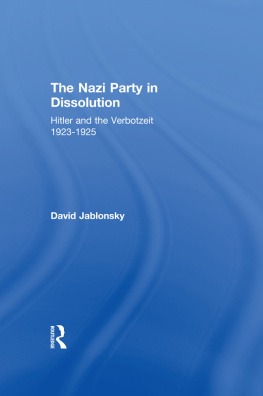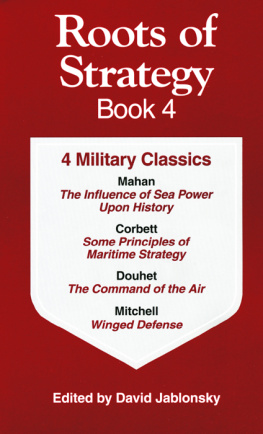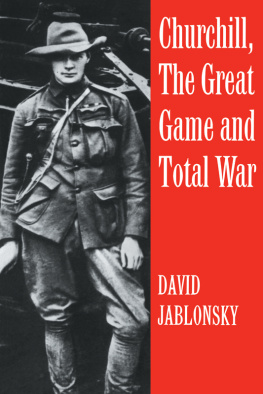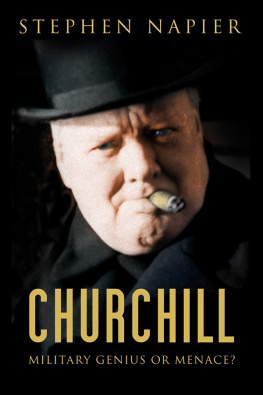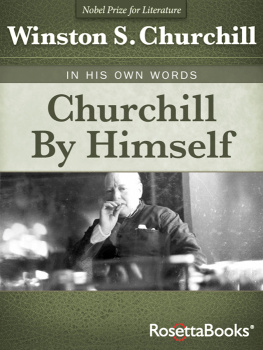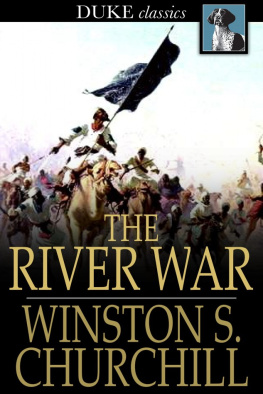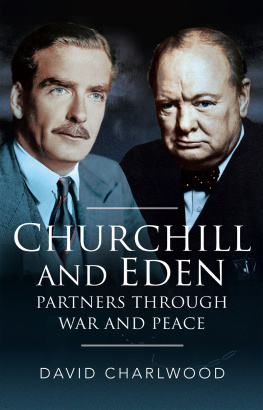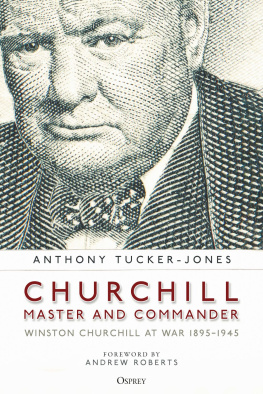CASS SERIES ON POLITICS AND MILITARY AFFAIRS
CHURCHILL AND HITLER
CASS SERIES ON POLITICS AND MILITARY AFFAIRS
Series Editor
MICHAEL I. HANDEL
U.S. Naval War College,
Newport, RI
Leon Trotsky and the Art of Insurrection 19051917
H.W. Nelson
The Nazi Party in Dissolution: Hitler and the Verbotzeit 19231925
David Jablonsky
War, Strategy and Intelligence
Michael I. Handel
Cossacks in the German Army 19411945
Sam Newland
A Donat War
second edition
Sir David Hunt
Churchill, The Great Game and Total War
David Jablonsky
Churchill and Hitler: Essays on the
Political-Military Direction of Total War
David Jablonsky
Singapore, 194142
new edition
Louis Allen
CHURCHILL AND HITLER
ESSAYS ON THE POLITICAL-MILITARY DIRECTION OF TOTAL WAR
DAVID JABLONSKY
US Army War College
First published 1994 by
FRANK CASS & CO. LTD.
Published 2013 by Routledge
2 Park Square, Milton Park, Abingdon, Oxon OX14 4RN
711 Third Avenue, New York, NY, 10017, USA
Routledge is an imprint of the Taylor & Francis Group, an informa business
Copyright 1994 David Jablonsky
British Library Cataloguing in Publication Data
Jablonsky, David. Churchill and Hitler:Essays on the Political-military Direction of Total War. (Cass Series on Politics & Military Affairs)
I. Title II. Series
940.53
Library of Congress Cataloging in Publication Data
Jablonsky, David.
Churchill and Hitler : essays on the politicalmilitary direction of total war / David Jablonsky.
p. cm. (Cass series on politics and military affairs)
1. Militarism. 2. Military art and science. 3. Churchill, Winston, Sir, 18741965. 4. Hitler, Adolf, 18891945. I. Title. II. Series.
U21.2.J32 1994
355.023dc20
94-5767
CIP
ISBN 13: 978-0-714-64563-6 (hbk)
ISBN 13:978-0-714-64119-5 (pbk)
All rights reserved. No part of this publication may be reproduced in any form or by any means, electronic, mechanical, photocopying, recording or otherwise, without the prior permission of the publisher.
Typeset by Regent Typesetting, London
Contents
For
Kyra Wiebke Jablonsky
Ithaca College, 1994
With great love and pride
For I dipt into the future,
far as human eye could see,
Saw the Vision of the world,
and all the wonder that would be;
Alfred, Lord Tennyson,
Locksley Hall
The essays collected in this volume deal with two of the greatest warlords in world history. Some may object to the connection of Winston Churchill with Adolf Hitler in this context. Certainly, despite some recent revisionist approaches to Churchill, there is still general agreement that the British statesman was truly the Man of the Century a judgment that will continue to stand the test of time not only against such revisionist efforts, but also against the more extreme and ultimately counterproductive hagiographic approaches to Churchill. In a similar manner, there has been nothing in revisionist scholarship during the half century since Hitlers death that alters fundamentally the negative judgments of the Nazi leader and his criminal regime.
Nevertheless these two men were bound together in their roles as leaders of their nations during the most total war in history. National strategy in such a conflict calls for the use of all the elements of national power not only military, but political, psychological and economic as well. Ultimately, success rests on the calculated relationship of these national means to the national ends, the essence of strategy. And ultimately, as these essays are designed to demonstrate, it was Churchill, not Hitler, who best understood the nature of that calculation.
I am very much indebted to the following for permission to reproduce previously published articles: US Army Strategic Studies Institute for . My thanks also to Mr Richard Langworth, President, International Churchill Society, United States; Colonel Karl Robinson, former Director, US Army Strategic Studies Institute; Dr Gary Guertner, former Director of Research, Strategic Studies Institute; Mrs Marianne Cowling, Editor, Strategic Studies Institute; Professor Arthur F. Lykke, Jr., US Army War College; Mr Lawrence Miller and his colleagues, Graphics Art Branch, US Army War College; and for typing support, Mrs Susan Blubaugh, Mrs Sandy Foote and, in particular, Mrs Rosemary Moore. Finally, I am especially grateful to Michael Handel, an office mate for much too short a time; and to Wiebke, as always, the keeper of the gate.
David Jablonsky
Carlisle, Pennsylvania
Cartoon published in Worlds Press News, 26 April 1945
Introduction: The Clausewitzian Trinity
Winston Churchill and Adolf Hitler almost met in 1932. In August of that year, the future British leader mounted a family expedition to the Low Countries and Germany as part of his research on the Life of Marlborough. The trip traced the 1705 march by Churchills celebrated ancestor from the Netherlands to the Danube and concluded with a week-long stay at the Regina Hotel in Munich. At that point, Churchill was approached by Ernst Putzi Hanfstaengel, a long-time friend and benefactor of Hitler, with an offer to arrange a meeting with the Nazi leader. Churchill agreed to the meeting, but nothing came of the offer.1
Both men were out of power at the time. Churchills wilderness years had begun in 1929 with the fall of the Conservative government and would continue until May 1940 when he kissed hands as Prime Minister of Great Britain. Hitler, on the other hand, had never known anything but the wilderness. By August 1932, however, events were moving his way. In the general election of 31 July, the Nazis had become the largest party in the state and, shortly after the aborted Munich meeting with Churchill, Hitler turned down the offer of becoming Vice-Chancellor in the von Papen government. His was a higher goal, which he attained at the beginning of the next year in a process as legal as that which ushered Churchill into office seven years later.
By this time, the last total war of the twentieth century was underway, and Churchill and Hitler were the dominant political-military leaders of their nations, truly the embodiment of Carl von Clausewitzs dictum that policy is the guiding intelligence and war only the instrument.2 The essence of such leadership was an understanding of the massive changes in the nature of war and strategy which began in the Napoleonic era, continued throughout the nineteenth century and the formative years of both leaders at the end of that century, and culminated in the First World War, the first modern total war. How well both of these warlords responded to these changes and what experiences conditioned their responses are the central themes of the essays in this volume.
The Changing Nature of War and Strategy


